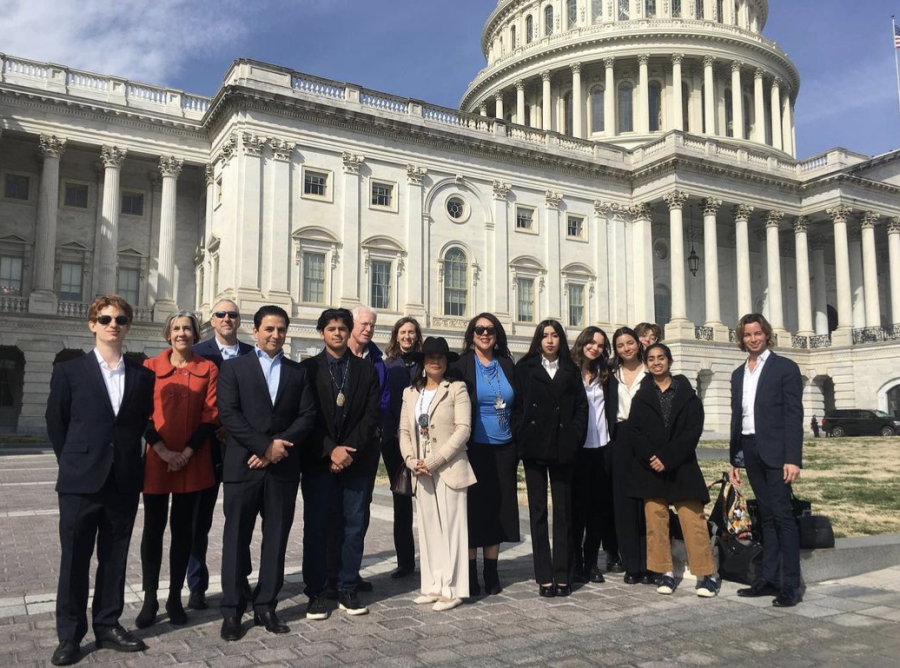Calling on congress
Students travel to DC to fight for Muwekma recognition
April 19, 2023
Four Palo Alto High School students recently returned from a trip to Washington D.C. with Muwekma Ohlone leaders to petition Congress for the tribe’s federal recognition as a tribe.
The Muwekma were formerly recognized, and then lost their tribal status. The campaign to be re-recognized has been going on for years, and is finally reaching the ears of Congress. The Muwekma traveled to DC from March 6 to March 9 to meet with Congress and lobby for the return of their federally recognized status, and the students joined them to support them and learn from them.
The students — juniors Katya Oks, Athya Paramesh, Nico Landolfi, and Ella Bishop — were inspired to travel with the Muwekma by their history unit in the Social Justice Pathway, in which they learned about Kimberly Teehee, the Cherokee delegate to Congress, the ongoing issue of kidnapping and murdering Native American women, and the recognition of the Muwekma.
“I feel like Native American history is so disregarded in history classes, and I always wanted to learn more about the history of Indigenous people, especially in the United States,” Oks said. “And working with these people directly is so great not only because it’s different from just learning about it in class and like actually talking with these people who are affected by these issues feels more personal.”
They began a still ongoing project of writing postcards to advocate for the Muwekma’s recognition, and were offered the opportunity to travel to DC by their teacher. According to Oks, they all jumped at the chance.
Bishop said the students felt their role in meetings in D.C. were to provide additional support to the Muwekma.
“So I think we were just there to just show that it’s not just adults who are talking about it or like the tribe that’s talking about it,” Bishop said. “It’s schools and students as well.”
As representatives for the whole sixty students of the Social Justice Pathway, their potential influence on politics was important to emphasize, according to Bishop.
“We’re about to be voting age, we are the next generation of people who are going to be voting for you and we want to see what you do about these issues we care about,” she said.
Bishop emphasized that the Muwekma’s recognition is especially important because of their prior recognition that was stripped from them.
“It’s important to clarify that they were previously recognized by the BIA [Bureau of Indian Affairs], and it’s less of a like ‘let’s recognize this tribe!’ and more like undoing the mistake of the past and just reconfirming their original status,” she said.
Bishop said the trip fueled their passion for helping the Muwekma.
“We were already involved in this issue, but meeting those people and working alongside them really helped make this issue a personal matter for all of us,” Bishop said. “Because you hear their story like over and over again, trying to talk to these legislators and it’s just like, every time it’s still that same kind of impact.”
It also inspired them to continue their work for the Muwekma, they said.
“We were all like plotting out next steps, and talking to them has given us so much momentum and firepower to kind of keep this going,” Bishop said.” “It’s like it really keeps the wheels turning.”
Going forward, the students who went on the trip want to honor and fight for the Muwekma in new ways. For example, Oks mentioned the idea of placing a plaque for the Muwekma in the revamped Tower Building, and having a land acknowledgment during graduation.
“Honestly, the sky’s the limit, like there are so many ways we can take this and now that we’re back and regrouping with our SJP cohort as a whole, there’s just a lot more of us and we can get in a lot more places and get a lot more done,” Bishop said. “So we’re pretty optimistic about what we can do with it.”

